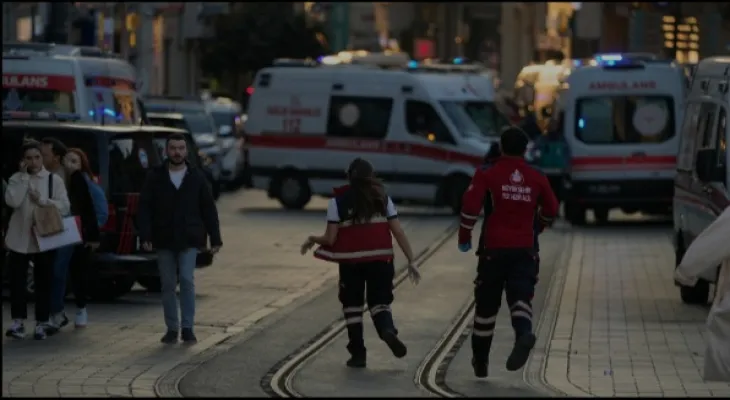Search here
Newspaper
Search here

Arab Canada News
News

Published: November 13, 2022
A bomb shook a crowded pedestrian street in the heart of Istanbul on Sunday, killing six people, injuring dozens, and leaving people terrified.
Emergency vehicles also rushed to the scene on Istiklal Street, a popular street lined with shops and restaurants that leads to the famous Taksim Square.
In one of the videos posted online, a loud boom could be heard and a flash was seen as passersby turned and fled.
Turkish President Recep Tayyip Erdoğan described the explosion as a "cowardly attack" and said the perpetrators would be punished. He did not mention who was behind the attack but said the "smell of terror" is emanating without giving details, adding that this has not yet been confirmed.
Also, Sunday's explosion served as a shocking reminder of the anxiety and safety concerns that have haunted Turkish residents over the years when such attacks were common, as the country experienced a series of bombings between 2015 and 2017, some by ISIS, and others by Kurdish militants seeking more autonomy or independence.
In recent years, Erdoğan has led a large-scale crackdown against militants as well as Kurdish deputies and activists, and amid rising inflation rates and other economic problems, Erdoğan's anti-terror campaign is a major rallying point for him ahead of next year's presidential and parliamentary elections.
Erdoğan, who left Sunday heading to the G20 summit in Indonesia, also said six people were killed. Vice President Fuat Oktay estimated the number of injured at 81, including two in serious condition, and also said it was apparently a terrorist attack.
Justice Minister Bekir Bozdağ told the government-aligned A Haber channel that investigators were focusing on a woman who sat on a seat next to the explosion site for about 40 minutes. The explosion occurred minutes after she left, saying her identity is still unclear, and it is not yet clear which group might be behind the attack. A restaurant manager near the place where the bomb exploded said he heard the blast and saw people running. Dozens of customers inside his restaurant, including women and children, panicked and screamed. The manager, who spoke on condition of anonymity due to the sensitivity of the situation, stated that he closed his restaurant shutters fearing another explosion and tried to calm the customers. After about 15 to 25 minutes inside, he saw the police on the street and organized the customers and his staff to leave in small groups.
In the same context, several foreign governments offered their condolences, including neighboring Greece, with whom relations have been tense. Prime Minister Kyriakos Mitsotakis said he was "shocked and saddened by the news of the heinous attack."
Following the attacks that took place between 2015 and 2017 which left more than 500 civilians and security personnel dead, Turkey launched military operations across the border in Syria and northern Iraq against Kurdish militants, while also cracking down on Kurdish politicians, journalists, and activists domestically.
While Turkey, the United States, and the European Union consider the Kurdish militants, known as the Kurdistan Workers' Party, a terrorist organization, critics say Erdoğan has also used broad anti-terror laws to stifle freedom of expression.
Recently, Turkey enacted a controversial "disinformation law" that punishes social media users with up to three years in prison for spreading false information about local or international security, public order, or health. Critics say the wording of the article is very vague and can be used to eliminate opposition.
Additionally, police said on Sunday that they identified 25 social media users who shared "provocative content" that could conflict with this law.
In another example of the restrictions the country imposes on the press, the Turkish media watchdog imposed temporary restrictions on reporting the Sunday explosion – a step that bans the use of close-up videos and images of the explosion and its aftermath. The Supreme Council of Radio and Television has imposed similar bans in the past following attacks and incidents.
Comments